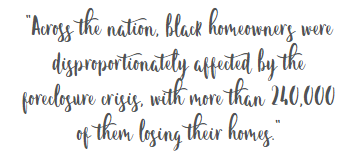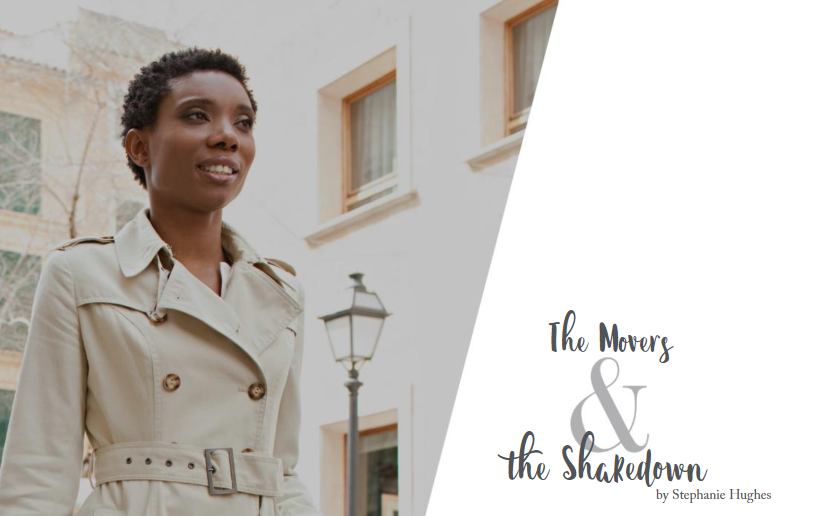America has long been crowned as the land of dreamers, the land of opportunity, and if you work hard enough and remain diligent, there is nothing you can’t achieve. The wealth is in land and labor, and it’s that which accumulates, you can control, and pass on to the next generation. Black people are not very active in the home buying market today and the likelihood of changing this outlook is bleak. As the Pew Research Center reports, in 1994, 42.3 percent of black households owned their homes; in 2016, their homeownership rate is 41.3 percent. The dream of homeownership is fleeting for black households stemming from being a historically disadvantaged group. As we look at the effects of the foreclosure and unemployment crisis resulting from the Great Recession, an optimistic outlook is hard to find.
In examining the contributing factors and consequences of the 2007-2008 foreclosure crisis, the ramifications of housing discrimination against black householders, then and now, remain virtually unchanged. With the influx of stable employment and easily accessible mortgages, many Blacks were able to participate in the American dream of homeownership. But with the ease and accessibility of ownership came subprime loans, manipulated interest rates and overpayment of homes. It was a ticking time bomb.
Across the nation, black homeowners were disproportionately affected by the foreclosure crisis, with more than 240,000 of them losing their homes. In a 2014 article investigating the foreclosure crisis, Nathalie Baptiste presents staggering facts regarding the deterioration of black wealth. She states that the foreclosures affected blacks of all income brackets, and high-earning blacks were 80 percent more likely to lose their homes than their white counterparts.

According to a recent report from The Pew Research Center, as of 2013, the median net worth of households headed by whites was roughly 13 times greater than that of black households. The losses suffered by one group aren’t more or less important than the other, but based on history, housing trends and access to credit, the impact among the black community is meaningful because of its scale. Usually when a family endures economic hardship or the loss of a home, their financial resources may serve as a safety net. Real estate is the primary vehicle for generational wealth transfer, and for this reason it represented the largest investment of black people, and in most cases, the only significant asset.
Additionally, during this recession blacks suffered the greatest losses in employment which added another layer to an already overburdened people. Although black people were not the only people who suffered loss, the detriment to this group is compounded when there is less to lose; loss just simply hurts more. As a licensed real estate broker, business owner and professional highly active during this 2005 time frame, I can remember friends and colleagues, me included, being excited that we achieved homeownership. We worked hard, made great money and we were ready to continue building our businesses and our assets. Until the crisis hit.
The shakedown was so sudden. Mortgage payments adjusted, job loss was rampant and revenues dropped to their lowest. It was a fight to see. This losing battle consumed all attempts at every swing, exhausting all savings and what little assets we had left. This was far from a dream. It was more like a nightmare; you hit bottom, you wake up and then there is nothing.
Of course in the aftermath, once the dust settled, reports confirmed that black women were specifically targeted for subprime loans in the build up to this explosion. As Baptiste highlights:
• Women of color were the most likely group to be given subprime loans, while white men were the least likely, with the disparity growing with income levels
• Compared to white men earning equal income, black women earning less than the area median income were two and a half times more likely to receive subprime loans
• Upper-income black women were roughly five times more likely to receive subprime purchase mortgages than upper-income white men
Income is essential to produce the capital needed to participate in any market, but the lack of access and the ability of black people to control their income excludes them from the home buying market today. The pervasive unemployment rate of black people is growing nationally and is even more at a state of crisis amongst black men. According to the Bureau of Labor Statistics’ (BLS) Labor Force Characteristics by Race and Ethnicity, 2015, It remains fact that black people hold one of the lowest employment-population ratios at 55.7 percent. Interestingly enough, this report also captures a general sentiment present in this labor data, the “discouraged worker.” Black people make up a high proportion of this group, with 28 percent, comprised of people not currently looking for employment because they believe no jobs are available to them. Consider the impact that income uncertainty or instability also adds, placing land purchase out of reach for black people. At this point, this shakedown feels more like a takedown. What we have all been told is, “Pull yourself up by your boot straps.” Well for this group, it seems the straps on these boots are broken.
A New Hope
Black women-owned businesses increased by 66.9 percent to 1,521,494 from 2007 to 2012, employing 316,977 people in addition to the owner and generating $42.2 billion in receipts, according to the National Women’s Business Council (NWBC). Women business owners are getting it done. These movers have always pressed forward and have come so far. More women every day are willing to give up “what is for sure” in pursuit of “what could be.” With an increased economic focus, increased access to capital and the encouragement of other groups, black women business owners are a growing force stepping in the right direction. Within the black community lies untapped creativity and innovation that can add to the advancement of all people. Welcome its contributions. We all get to decide what part we want to play in truly making America Great, not necessarily again, but perhaps for the first time ever.
Stephanie Hughes
Business Owner & Broker
Associate of Hass Team Realty

 Login
Login

